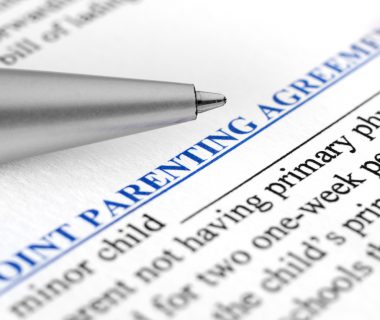If you are a parent going through a divorce or a parentage case, the most important final paperwork that will be entered will be your Allocation Judgment (formerly known as a “Custody Judgment”) – also referred to as a parenting plan. The parenting plan will detail the specifics on a wide variety of issues ranging from parenting time, decision-making, holiday schedules and extracurricular activities – and how this wide variety of issues should be addressed after the divorce is finalized.
While parents may disagree on what terms and conditions reflect the best interests of the child, the parties are strongly encouraged to come to an agreement with each other regarding these crucial issues. If the parents are unable to see eye to eye on what terms should constitute the final Allocation Judgment, in most counties mediation will be required, or the judge may appoint a Guardian Ad Litem or Child Representative to investigate the best interests of your child.
What Are the Essential Elements to Include in a Parenting Plan?
The Illinois Marriage and Dissolution of Marriage Act mandates that a parenting plan include the allocation of parental responsibilities, which comprises of both parenting time and significant decision-making responsibilities (formerly known as “custody”). There are many other terms that fall under this umbrella, but the following are some of the essential elements that are addressed in a parenting plan:
- Living arrangements: The plan must state which of the party’s residential addresses will be used for school registration purposes (if the child is attending public school). In addition, the plan must list which party’s residence is considered the child’s “current primary residence.” This is required even if the parents are exercising equal parenting time – the “primary residence” will act as the starting point on the map should either party seek to move or relocate with the child after the final judgments are entered.
- A school-year or “routine” parenting schedule: A “routine” parenting schedule will break down the dates and times regarding the default parenting schedule that will be in place unless superseded by a holiday/special day or a vacation. The routine schedule will be the primary breakdown of parenting time utilized by the parties, so this is often the most difficult portion of the Allocation Judgment for the parties to reach an agreement.
- Holiday and special days (and vacation schedule): The parenting plan will also determine holidays, special days, vacations and school breaks – and whether the parents will alternate certain time frames (like Spring Break) or split time during others (like Winter Break or the Summer). To read more about sharing parenting time during the holiday season, visit our blog from November 20, 2020.
- Transportation: It is important to include details on transportation for the child between each parent’s residences or school at the start or end of parenting time, along with the requirements to transport to/from the child’s extracurricular activities.
- Medical care: There will need to be terms in the parenting plan that address the responsibility of making medical decisions, how emergency events are handled, and how the parents should communicate with each other regarding medically-related issues involving the child.
- Communication between parents, and also with the child: The Allocation Judgment can assist parents by putting rules and conditions in place for how the parents communicate with each other (i.e. in writing, using a shared calendar, etc.) – and also putting time frames in place for when the non-assigned parent will have contact with the child.
- Child-related expenses such as education or extracurricular expenses: Sometimes a parenting plan will set forth the financial responsibility of each party for required education expenses such as school supplies and fees, or for costs incurred from a child’s extracurricular activities. To read more about on this topic, please visit our August 14, 2020 blog.
A thorough and well-thought-out parenting plan will assure that your child’s best interests are protected, and it can pave the way for smoother interactions between you and your co-parent in the future.
Ideally you and your co-parent are able to work towards an amicable resolution in your divorce – and specifically for all matters relating to any minor children you share. In order to reach those goals, however, having knowledgeable and compassionate legal representation is the key.
Contact us at 312-782-2220 for a consultation to discuss with an experienced attorney at Davis Friedman. We can help facilitate an optimal parenting plan to ensure that your child’s best interests are put to the forefront.
